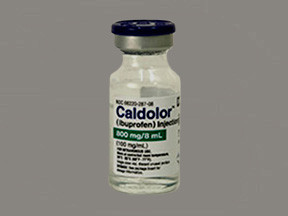IBUPROFEN - INJECTION
PHONETIC PRONUNCIATION: (eye-byou-PRO-fen)
COMMON BRAND NAME(S): Caldolor
GENERIC NAME(S): ibuprofen
Uses
USES: Ibuprofen is used for the short-term treatment of mild to moderate pain in adults. When used with a narcotic (such as morphine) it may be used to treat moderate to severe pain. It is also used to reduce fever. This medication is a nonsteroidal anti-inflammatory drug (NSAID).
How to use IBUPROFEN - INJECTION
HOW TO USE: Read the Medication Guide provided by your pharmacist before you start using ibuprofen and each time you get a refill. If you have any questions, ask your doctor or pharmacist. If you are using this medication at home, read and learn all preparation and usage instructions from the manufacturer or from your health care professional. If you have any questions about using this medication properly, consult your doctor or pharmacist. Before using, check this product visually for particles or discoloration. If either is present, do not use the liquid. Follow your doctor's directions carefully. This medication is diluted and then given by injection into a vein for 30 minutes. When used to treat pain, it is usually injected every 6 hours as needed. When used to reduce fever, this drug may be injected every 4 to 6 hours as needed. Learn how to store and discard needles and medical supplies safely. Consult your pharmacist for more details. Drink plenty of fluids while using this medication unless your doctor tells you otherwise. To reduce your risk of stomach bleeding and other side effects, use this medication at the lowest effective dose for the shortest possible time. Do not increase your dose, use it more frequently, or use it for a longer time than prescribed. Remember that pain medications work best if they are used as the first signs of pain occur. If you wait until the pain has significantly worsened, the medicine may not work as well. Tell your doctor if your pain or fever persists or worsens.
Side Effects
Precautions
Interactions
Overdose
Images
Reviews
Faq for IBUPROFEN - INJECTION
Ibuprofen injection is primarily used to relieve pain, reduce fever, and reduce inflammation in conditions such as arthritis, menstrual cramps, dental pain, and postoperative pain.
Ibuprofen injection acts by inhibiting the production of certain chemicals in the body that cause pain, fever, and inflammation. It belongs to a class of drugs called nonsteroidal anti-inflammatory drugs (NSAIDs).
The dosage of Ibuprofen injection depends on the specific condition being treated and the patient's overall health. It is usually administered by a healthcare professional in a hospital setting.
Common side effects of Ibuprofen injection may include nausea, vomiting, dizziness, headache, and skin rash. Serious side effects such as stomach bleeding or kidney problems are rare but can occur.
Ibuprofen injection is generally not recommended for use in children, as it is usually administered in a hospital setting for severe pain management. However, there may be certain cases where a doctor may prescribe it for children.
Ibuprofen injection may interact with certain medications, including blood thinners, certain antidepressants, and other NSAIDs. It is important to inform your healthcare provider about all the medications you are taking before receiving Ibuprofen injection.
Ibuprofen injection is generally not recommended during pregnancy, especially in the third trimester. It may also pass into breast milk and could harm a nursing baby. Consult with your doctor before using Ibuprofen injection if you are pregnant or breastfeeding.
The onset of action of Ibuprofen injection is relatively fast, usually within 30 minutes to an hour. However, the full effect may take a few hours to be achieved.
Ibuprofen injection is generally not intended for long-term use. It is usually used for short-term pain relief or inflammation reduction. Consult with your doctor if you require long-term treatment options.
Warning
WARNING: This drug may rarely cause serious (rarely fatal) bleeding from the stomach or intestines. Also, nonsteroidal anti-inflammatory drugs (including ibuprofen) may rarely increase the risk for a heart attack or stroke. This effect can happen at any time while using this drug but is more likely if you use it for a long time. The risk may be greater if you have heart disease or increased risk for heart disease (for example, due to smoking, family history of heart disease, or conditions such as high blood pressure or diabetes). Do not use ibuprofen right before or after heart bypass surgery (CABG). Talk to your doctor or pharmacist about the benefits and risks of treatment, as well as other possible medication choices. If you notice any of the following rare but very serious side effects, stop using ibuprofen and seek immediate medical attention: black/tarry/bloody stools, persistent stomach/abdominal pain, vomit that looks like coffee grounds, chest pain, weakness on one side of the body, sudden vision changes, slurred speech.
Disclaimer
IMPORTANT: HOW TO USE THIS INFORMATION: This is a summary and does NOT have all possible information about this product. This information does not assure that this product is safe, effective, or appropriate for you. This information is not individual medical advice and does not substitute for the advice of your health care professional. Always ask your health care professional for complete information about this product and your specific health needs.

No Reviews Yet